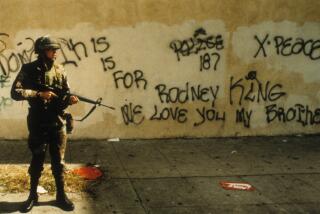NAACP Official Stands by Controversial Remarks : Denny case: Joseph Duff touched off an outcry when he said rioters who beat trucker were a lynch mob. Some say the reaction shows how deeply the black community is divided after the riots.
- Share via
The Los Angeles branch of the NAACP has become embroiled in a controversy over comments made by its president comparing the beating of trucker Reginald O. Denny to the actions of “a lynch mob.”
Joseph H. Duff, who heads the local chapter of the National Assn. for the Advancement of Colored People, caused the stir when he made the politically charged comparison in an interview just as the trial of two men accused in last year’s attack on Denny was about to begin.
The controversy was triggered when Duff used the phrase “lynch mob”--a term associated with the painful history of torture and murder of blacks by mobs of whites--to describe the behavior of black rioters who beat the white trucker after the not guilty verdicts in the state trial of four LAPD officers in the beating of Rodney G. King.
Duff told the Wave weekly newspaper: “Certainly it was a mob that was outraged because of the (verdicts), and that was the clear motivation. But that mob attacked (Denny) because of the color of his skin and in our memory that is a lynch mob.”
Duff also said Denny’s assailants should be prosecuted to the “full extent of the law.”
Reaction to the comments illustrated some of the deep divisions in the African-American community over how to interpret the rioting and its aftermath.
The issue infuriated community activists leading a grass-roots campaign in support of the two Denny case defendants. Many African-American leaders, however, were reluctant to address Duff’s comments directly, preferring to privately criticize his stand for not taking into account the underlying social causes that contributed to the violence.
But in an interview with The Times, Duff insisted that his comments were consistent with his basic nonviolent tenets and those of the organization he has headed since 1989.
“Take a picture of that mob scene (at Florence and Normandie avenues) showing gang members flashing signs and place it next to an old photo of a lynching showing whites laughing and standing over the body of a black man,” Duff said. “You will see the similarities.”
Duff acknowledged that he may have caused less controversy by eliminating the word lynch and just using “mob rule” or “the rule of violence.”
“I speak on the basis of principles that I have believed in for some time. These are principles that are seared into my psyche,” he said. “I wouldn’t throw principles out by putting my finger in the air to check which way the wind blows.”
The community activists supporting the Denny trial defendants accused Duff of jeopardizing their legal case and called for Duff’s resignation. Some of them denounced the nation’s oldest civil rights organization as being out of touch with the people it serves.
“His remarks were historically and morally out of place,” said S. Deacon Alexander, president of the Unemployed Council, an activist group that has occupied riot reconstruction sites to force contractors to hire more blacks. “The rebellion was not a planned act carried out by people in white sheets, but a reaction to a pattern of injustices.”
Alexander and others said that lynch mobs often operated in the South earlier this century with the contrivance and approval of the larger white community, including the legal system. But at Florence and Normandie avenues, they added, the larger black community did not approve of the violence and for a time was the only force attempting to restore order and save victims.
Alexander led a small demonstration last month outside the NAACP headquarters. The protest prompted the local branch to request a closed-door meeting with Alexander and a small, vociferous group of critics, including Georgiana Williams, whose son, Damian Monroe Williams, is on trial with Henry Keith Watson on charges of beating Denny.
“It’s disgraceful,” said Georgiana Williams, describing Duff’s comments after the meeting.
On Sept. 1, Duff wrote to Alexander detailing his commitment to “elimination of corrupt police and criminal justice practices.” But he would not resign or retract his description of the Denny beating.
In response to the meeting with activists, the NAACP sent an attorney who is a member of the chapter’s executive board to observe the trial. The NAACP board defended Duff’s right to speak out, although several members questioned his choice of words.
“There is no way I would make such a comparison,” said John Mance, a member of the NAACP national board and second vice president of the local branch. “We haven’t seen any bodies of white men hanging from trees. We haven’t seen hounds being led by black men chasing whites.”
The Rev. Benjamin F. Chavis Jr., national NAACP president, was not available for comment.
Duff, who is a civil rights attorney, said he made his comments during a “bridge” between the sentencing of the two officers convicted this year in the King federal case and the start of the Denny beating trial.
“There is a tremendous amount of distrust in the community when to comes to criminal justice and the rule of law,” Duff said. “It was a good time to talk about it and when it comes to the rule of law, the NAACP has always been a leader.”
He said the NAACP had pushed for prosecution to the full extent of the law in the King and Denny cases, and that disappointment over the King case outcome did not justify a call for leniency for the Denny case defendants.
Indeed, Duff disagrees with those who argue that the Denny case is a mirror image of the King beating--this time with a white victim being beaten by blacks. He refused to link the cases, other than to say that in both instances “the judicial system should be made to work.”
Joe Hicks, executive director of the Southern Christian Leadership Conference, refused to discuss Duff’s comments, but said the controversy is an example of how torn the community has become over the issues of mistreatment in the criminal justice system.
“It’s clear the American criminal justice system is weighted against the poor and minority,” Hicks said. “The community is fraught with gut-wrenching emotionalism, where people are distraught by the scenes of violence during the riots,” Hicks said, “but it is also disturbed by the treatment of those accused in the (Denny) case.”
Kerman Maddox, a public affairs consultant and political science instructor at Southwest College, said the debate has focused on complaints by community activists with the civil rights organization.
“On the streets, no one is really talking about this,” he said. “Joe Duff is speaking to his constituency and said what a lot of people would like to say. That’s not going to help him with a lot of grass-roots organizations.”
Maddox said he measures the importance of an issue in the community by asking his students what they think is the burning issue. “No one mentioned the Duff controversy, but everyone was talking about Michael Jackson,” he said.
More to Read
Sign up for Essential California
The most important California stories and recommendations in your inbox every morning.
You may occasionally receive promotional content from the Los Angeles Times.













